Reflective Account: Transition to Registered Practice in Adult Nursing
VerifiedAdded on 2023/01/12
|9
|2978
|72
Essay
AI Summary
This reflective essay examines the transition to registered practice in adult nursing, focusing on legal and ethical frameworks, and the NMC code. The essay begins with an introduction defining the scope and context of the transition, emphasizing the importance of training and the need for registered nurses to manage chronic conditions. The main body delves into the legal and ethical frameworks underpinning adult nursing, including key legislation and acts like the Equality Act 2010 and the Data Protection Act 2014, as well as ethical principles such as autonomy and beneficence. The essay then explores the NMC standards, including the application of the Gibbs reflective model to analyze personal experiences and actions, and the importance of continuing professional development. Finally, the essay discusses personal development within the course and the role within the inter-professional team, highlighting the use of reflective practice to identify and address weaknesses and enhance clinical practices. The essay emphasizes the importance of maintaining patient privacy and confidentiality, respecting ethical principles, and working within the boundaries of competence.

Reflective account
Paraphrase This Document
Need a fresh take? Get an instant paraphrase of this document with our AI Paraphraser
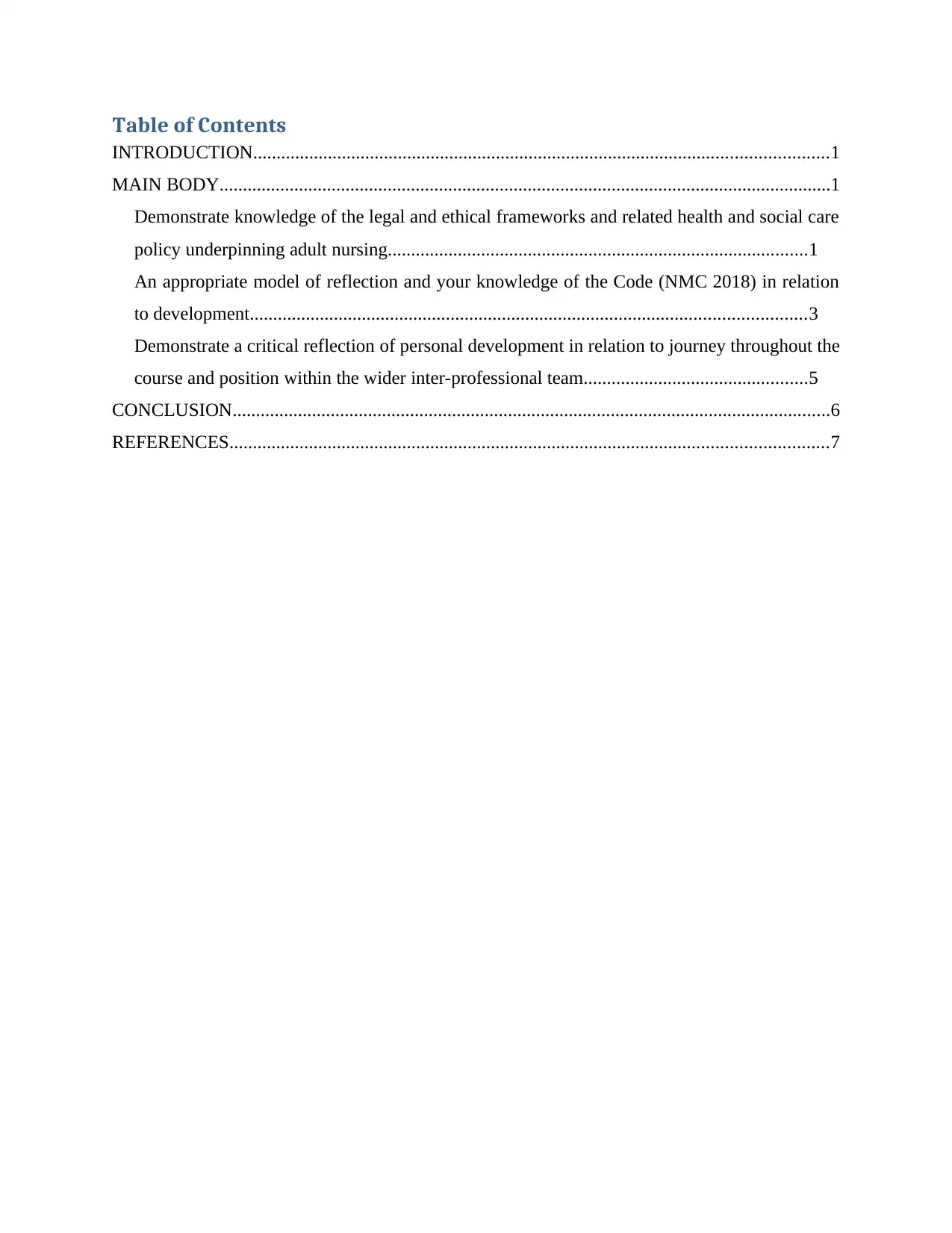
Table of Contents
INTRODUCTION...........................................................................................................................1
MAIN BODY...................................................................................................................................1
Demonstrate knowledge of the legal and ethical frameworks and related health and social care
policy underpinning adult nursing..........................................................................................1
An appropriate model of reflection and your knowledge of the Code (NMC 2018) in relation
to development.......................................................................................................................3
Demonstrate a critical reflection of personal development in relation to journey throughout the
course and position within the wider inter-professional team................................................5
CONCLUSION................................................................................................................................6
REFERENCES................................................................................................................................7
INTRODUCTION...........................................................................................................................1
MAIN BODY...................................................................................................................................1
Demonstrate knowledge of the legal and ethical frameworks and related health and social care
policy underpinning adult nursing..........................................................................................1
An appropriate model of reflection and your knowledge of the Code (NMC 2018) in relation
to development.......................................................................................................................3
Demonstrate a critical reflection of personal development in relation to journey throughout the
course and position within the wider inter-professional team................................................5
CONCLUSION................................................................................................................................6
REFERENCES................................................................................................................................7
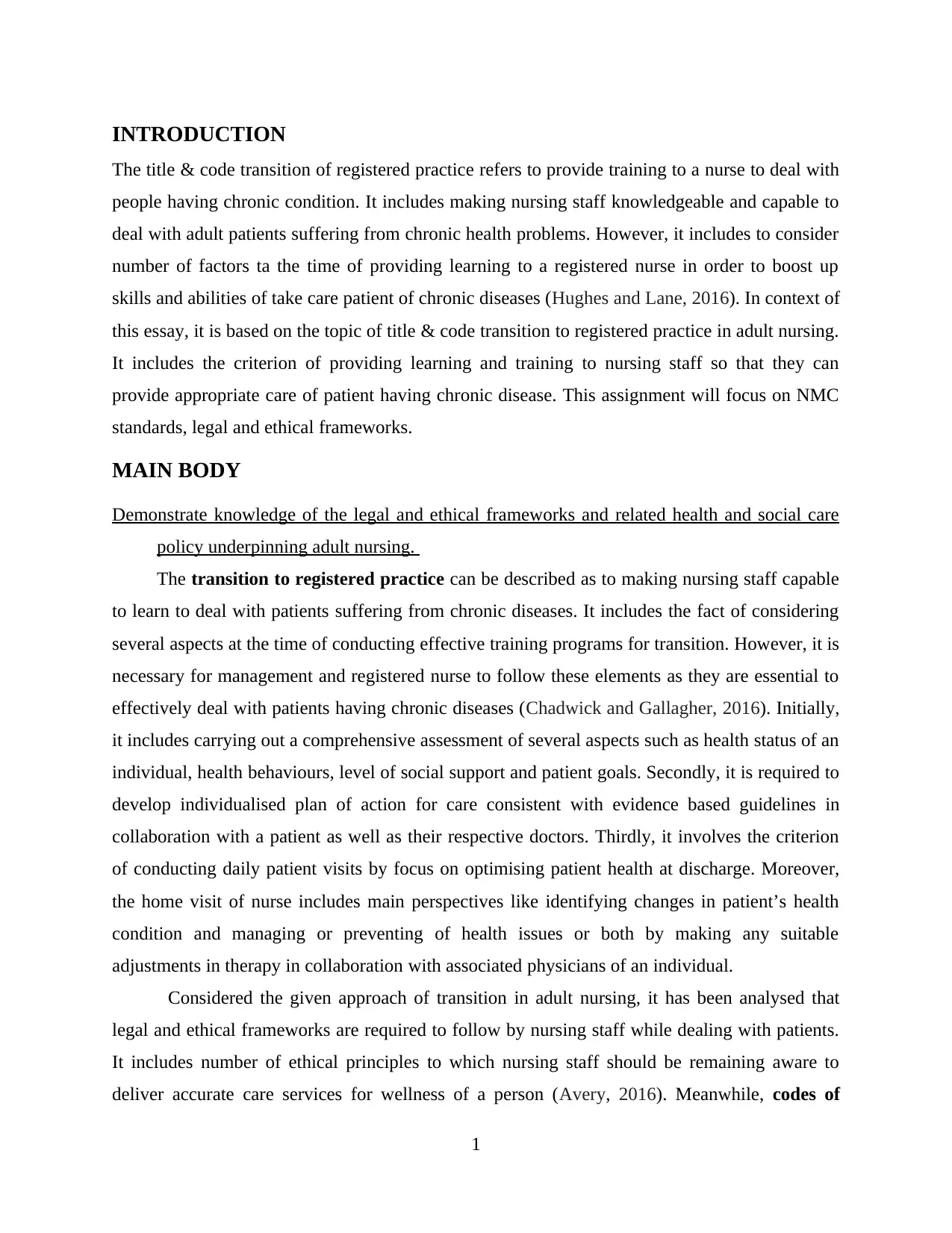
INTRODUCTION
The title & code transition of registered practice refers to provide training to a nurse to deal with
people having chronic condition. It includes making nursing staff knowledgeable and capable to
deal with adult patients suffering from chronic health problems. However, it includes to consider
number of factors ta the time of providing learning to a registered nurse in order to boost up
skills and abilities of take care patient of chronic diseases (Hughes and Lane, 2016). In context of
this essay, it is based on the topic of title & code transition to registered practice in adult nursing.
It includes the criterion of providing learning and training to nursing staff so that they can
provide appropriate care of patient having chronic disease. This assignment will focus on NMC
standards, legal and ethical frameworks.
MAIN BODY
Demonstrate knowledge of the legal and ethical frameworks and related health and social care
policy underpinning adult nursing.
The transition to registered practice can be described as to making nursing staff capable
to learn to deal with patients suffering from chronic diseases. It includes the fact of considering
several aspects at the time of conducting effective training programs for transition. However, it is
necessary for management and registered nurse to follow these elements as they are essential to
effectively deal with patients having chronic diseases (Chadwick and Gallagher, 2016). Initially,
it includes carrying out a comprehensive assessment of several aspects such as health status of an
individual, health behaviours, level of social support and patient goals. Secondly, it is required to
develop individualised plan of action for care consistent with evidence based guidelines in
collaboration with a patient as well as their respective doctors. Thirdly, it involves the criterion
of conducting daily patient visits by focus on optimising patient health at discharge. Moreover,
the home visit of nurse includes main perspectives like identifying changes in patient’s health
condition and managing or preventing of health issues or both by making any suitable
adjustments in therapy in collaboration with associated physicians of an individual.
Considered the given approach of transition in adult nursing, it has been analysed that
legal and ethical frameworks are required to follow by nursing staff while dealing with patients.
It includes number of ethical principles to which nursing staff should be remaining aware to
deliver accurate care services for wellness of a person (Avery, 2016). Meanwhile, codes of
1
The title & code transition of registered practice refers to provide training to a nurse to deal with
people having chronic condition. It includes making nursing staff knowledgeable and capable to
deal with adult patients suffering from chronic health problems. However, it includes to consider
number of factors ta the time of providing learning to a registered nurse in order to boost up
skills and abilities of take care patient of chronic diseases (Hughes and Lane, 2016). In context of
this essay, it is based on the topic of title & code transition to registered practice in adult nursing.
It includes the criterion of providing learning and training to nursing staff so that they can
provide appropriate care of patient having chronic disease. This assignment will focus on NMC
standards, legal and ethical frameworks.
MAIN BODY
Demonstrate knowledge of the legal and ethical frameworks and related health and social care
policy underpinning adult nursing.
The transition to registered practice can be described as to making nursing staff capable
to learn to deal with patients suffering from chronic diseases. It includes the fact of considering
several aspects at the time of conducting effective training programs for transition. However, it is
necessary for management and registered nurse to follow these elements as they are essential to
effectively deal with patients having chronic diseases (Chadwick and Gallagher, 2016). Initially,
it includes carrying out a comprehensive assessment of several aspects such as health status of an
individual, health behaviours, level of social support and patient goals. Secondly, it is required to
develop individualised plan of action for care consistent with evidence based guidelines in
collaboration with a patient as well as their respective doctors. Thirdly, it involves the criterion
of conducting daily patient visits by focus on optimising patient health at discharge. Moreover,
the home visit of nurse includes main perspectives like identifying changes in patient’s health
condition and managing or preventing of health issues or both by making any suitable
adjustments in therapy in collaboration with associated physicians of an individual.
Considered the given approach of transition in adult nursing, it has been analysed that
legal and ethical frameworks are required to follow by nursing staff while dealing with patients.
It includes number of ethical principles to which nursing staff should be remaining aware to
deliver accurate care services for wellness of a person (Avery, 2016). Meanwhile, codes of
1
⊘ This is a preview!⊘
Do you want full access?
Subscribe today to unlock all pages.

Trusted by 1+ million students worldwide
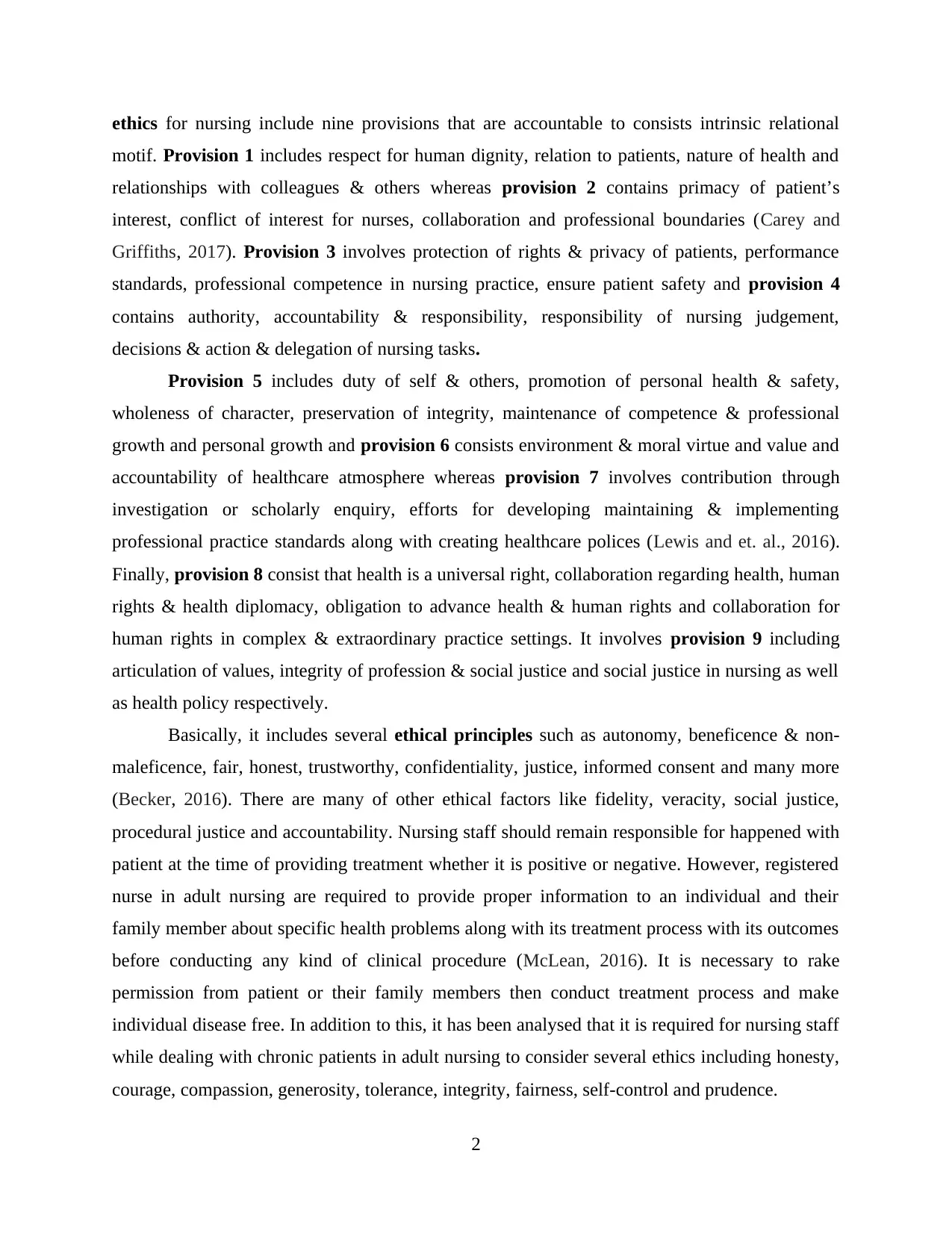
ethics for nursing include nine provisions that are accountable to consists intrinsic relational
motif. Provision 1 includes respect for human dignity, relation to patients, nature of health and
relationships with colleagues & others whereas provision 2 contains primacy of patient’s
interest, conflict of interest for nurses, collaboration and professional boundaries (Carey and
Griffiths, 2017). Provision 3 involves protection of rights & privacy of patients, performance
standards, professional competence in nursing practice, ensure patient safety and provision 4
contains authority, accountability & responsibility, responsibility of nursing judgement,
decisions & action & delegation of nursing tasks.
Provision 5 includes duty of self & others, promotion of personal health & safety,
wholeness of character, preservation of integrity, maintenance of competence & professional
growth and personal growth and provision 6 consists environment & moral virtue and value and
accountability of healthcare atmosphere whereas provision 7 involves contribution through
investigation or scholarly enquiry, efforts for developing maintaining & implementing
professional practice standards along with creating healthcare polices (Lewis and et. al., 2016).
Finally, provision 8 consist that health is a universal right, collaboration regarding health, human
rights & health diplomacy, obligation to advance health & human rights and collaboration for
human rights in complex & extraordinary practice settings. It involves provision 9 including
articulation of values, integrity of profession & social justice and social justice in nursing as well
as health policy respectively.
Basically, it includes several ethical principles such as autonomy, beneficence & non-
maleficence, fair, honest, trustworthy, confidentiality, justice, informed consent and many more
(Becker, 2016). There are many of other ethical factors like fidelity, veracity, social justice,
procedural justice and accountability. Nursing staff should remain responsible for happened with
patient at the time of providing treatment whether it is positive or negative. However, registered
nurse in adult nursing are required to provide proper information to an individual and their
family member about specific health problems along with its treatment process with its outcomes
before conducting any kind of clinical procedure (McLean, 2016). It is necessary to rake
permission from patient or their family members then conduct treatment process and make
individual disease free. In addition to this, it has been analysed that it is required for nursing staff
while dealing with chronic patients in adult nursing to consider several ethics including honesty,
courage, compassion, generosity, tolerance, integrity, fairness, self-control and prudence.
2
motif. Provision 1 includes respect for human dignity, relation to patients, nature of health and
relationships with colleagues & others whereas provision 2 contains primacy of patient’s
interest, conflict of interest for nurses, collaboration and professional boundaries (Carey and
Griffiths, 2017). Provision 3 involves protection of rights & privacy of patients, performance
standards, professional competence in nursing practice, ensure patient safety and provision 4
contains authority, accountability & responsibility, responsibility of nursing judgement,
decisions & action & delegation of nursing tasks.
Provision 5 includes duty of self & others, promotion of personal health & safety,
wholeness of character, preservation of integrity, maintenance of competence & professional
growth and personal growth and provision 6 consists environment & moral virtue and value and
accountability of healthcare atmosphere whereas provision 7 involves contribution through
investigation or scholarly enquiry, efforts for developing maintaining & implementing
professional practice standards along with creating healthcare polices (Lewis and et. al., 2016).
Finally, provision 8 consist that health is a universal right, collaboration regarding health, human
rights & health diplomacy, obligation to advance health & human rights and collaboration for
human rights in complex & extraordinary practice settings. It involves provision 9 including
articulation of values, integrity of profession & social justice and social justice in nursing as well
as health policy respectively.
Basically, it includes several ethical principles such as autonomy, beneficence & non-
maleficence, fair, honest, trustworthy, confidentiality, justice, informed consent and many more
(Becker, 2016). There are many of other ethical factors like fidelity, veracity, social justice,
procedural justice and accountability. Nursing staff should remain responsible for happened with
patient at the time of providing treatment whether it is positive or negative. However, registered
nurse in adult nursing are required to provide proper information to an individual and their
family member about specific health problems along with its treatment process with its outcomes
before conducting any kind of clinical procedure (McLean, 2016). It is necessary to rake
permission from patient or their family members then conduct treatment process and make
individual disease free. In addition to this, it has been analysed that it is required for nursing staff
while dealing with chronic patients in adult nursing to consider several ethics including honesty,
courage, compassion, generosity, tolerance, integrity, fairness, self-control and prudence.
2
Paraphrase This Document
Need a fresh take? Get an instant paraphrase of this document with our AI Paraphraser
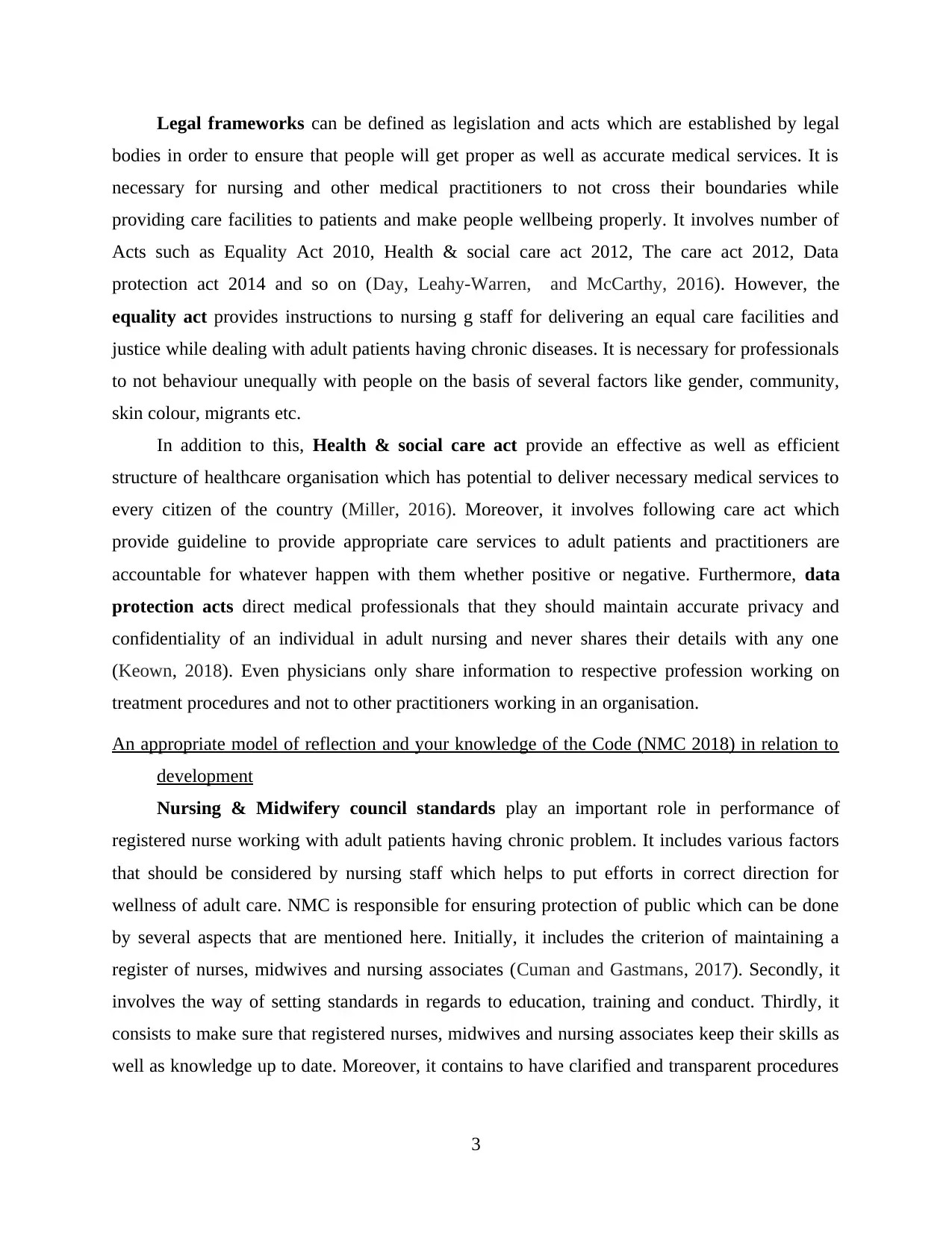
Legal frameworks can be defined as legislation and acts which are established by legal
bodies in order to ensure that people will get proper as well as accurate medical services. It is
necessary for nursing and other medical practitioners to not cross their boundaries while
providing care facilities to patients and make people wellbeing properly. It involves number of
Acts such as Equality Act 2010, Health & social care act 2012, The care act 2012, Data
protection act 2014 and so on (Day, Leahy-Warren, and McCarthy, 2016). However, the
equality act provides instructions to nursing g staff for delivering an equal care facilities and
justice while dealing with adult patients having chronic diseases. It is necessary for professionals
to not behaviour unequally with people on the basis of several factors like gender, community,
skin colour, migrants etc.
In addition to this, Health & social care act provide an effective as well as efficient
structure of healthcare organisation which has potential to deliver necessary medical services to
every citizen of the country (Miller, 2016). Moreover, it involves following care act which
provide guideline to provide appropriate care services to adult patients and practitioners are
accountable for whatever happen with them whether positive or negative. Furthermore, data
protection acts direct medical professionals that they should maintain accurate privacy and
confidentiality of an individual in adult nursing and never shares their details with any one
(Keown, 2018). Even physicians only share information to respective profession working on
treatment procedures and not to other practitioners working in an organisation.
An appropriate model of reflection and your knowledge of the Code (NMC 2018) in relation to
development
Nursing & Midwifery council standards play an important role in performance of
registered nurse working with adult patients having chronic problem. It includes various factors
that should be considered by nursing staff which helps to put efforts in correct direction for
wellness of adult care. NMC is responsible for ensuring protection of public which can be done
by several aspects that are mentioned here. Initially, it includes the criterion of maintaining a
register of nurses, midwives and nursing associates (Cuman and Gastmans, 2017). Secondly, it
involves the way of setting standards in regards to education, training and conduct. Thirdly, it
consists to make sure that registered nurses, midwives and nursing associates keep their skills as
well as knowledge up to date. Moreover, it contains to have clarified and transparent procedures
3
bodies in order to ensure that people will get proper as well as accurate medical services. It is
necessary for nursing and other medical practitioners to not cross their boundaries while
providing care facilities to patients and make people wellbeing properly. It involves number of
Acts such as Equality Act 2010, Health & social care act 2012, The care act 2012, Data
protection act 2014 and so on (Day, Leahy-Warren, and McCarthy, 2016). However, the
equality act provides instructions to nursing g staff for delivering an equal care facilities and
justice while dealing with adult patients having chronic diseases. It is necessary for professionals
to not behaviour unequally with people on the basis of several factors like gender, community,
skin colour, migrants etc.
In addition to this, Health & social care act provide an effective as well as efficient
structure of healthcare organisation which has potential to deliver necessary medical services to
every citizen of the country (Miller, 2016). Moreover, it involves following care act which
provide guideline to provide appropriate care services to adult patients and practitioners are
accountable for whatever happen with them whether positive or negative. Furthermore, data
protection acts direct medical professionals that they should maintain accurate privacy and
confidentiality of an individual in adult nursing and never shares their details with any one
(Keown, 2018). Even physicians only share information to respective profession working on
treatment procedures and not to other practitioners working in an organisation.
An appropriate model of reflection and your knowledge of the Code (NMC 2018) in relation to
development
Nursing & Midwifery council standards play an important role in performance of
registered nurse working with adult patients having chronic problem. It includes various factors
that should be considered by nursing staff which helps to put efforts in correct direction for
wellness of adult care. NMC is responsible for ensuring protection of public which can be done
by several aspects that are mentioned here. Initially, it includes the criterion of maintaining a
register of nurses, midwives and nursing associates (Cuman and Gastmans, 2017). Secondly, it
involves the way of setting standards in regards to education, training and conduct. Thirdly, it
consists to make sure that registered nurses, midwives and nursing associates keep their skills as
well as knowledge up to date. Moreover, it contains to have clarified and transparent procedures
3
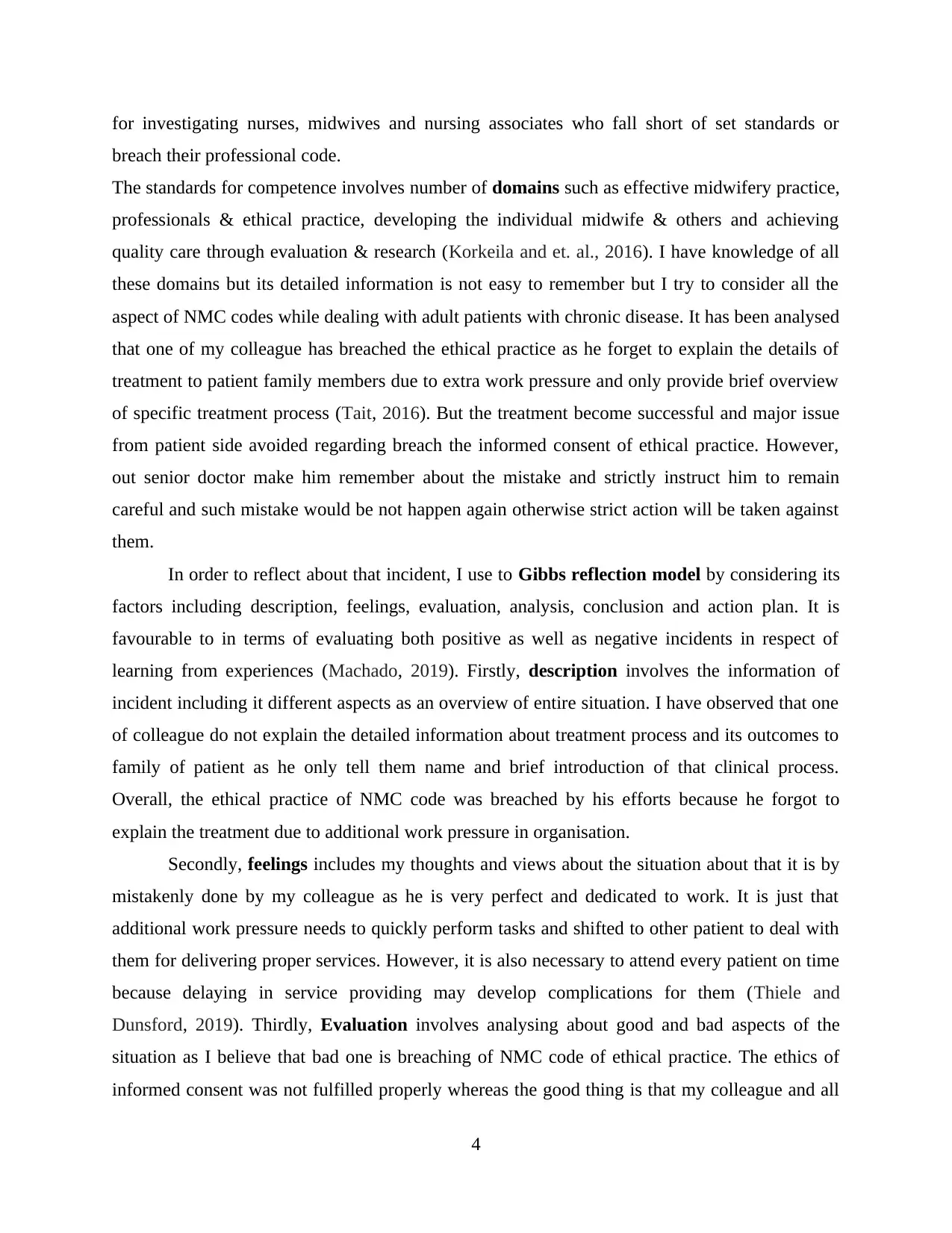
for investigating nurses, midwives and nursing associates who fall short of set standards or
breach their professional code.
The standards for competence involves number of domains such as effective midwifery practice,
professionals & ethical practice, developing the individual midwife & others and achieving
quality care through evaluation & research (Korkeila and et. al., 2016). I have knowledge of all
these domains but its detailed information is not easy to remember but I try to consider all the
aspect of NMC codes while dealing with adult patients with chronic disease. It has been analysed
that one of my colleague has breached the ethical practice as he forget to explain the details of
treatment to patient family members due to extra work pressure and only provide brief overview
of specific treatment process (Tait, 2016). But the treatment become successful and major issue
from patient side avoided regarding breach the informed consent of ethical practice. However,
out senior doctor make him remember about the mistake and strictly instruct him to remain
careful and such mistake would be not happen again otherwise strict action will be taken against
them.
In order to reflect about that incident, I use to Gibbs reflection model by considering its
factors including description, feelings, evaluation, analysis, conclusion and action plan. It is
favourable to in terms of evaluating both positive as well as negative incidents in respect of
learning from experiences (Machado, 2019). Firstly, description involves the information of
incident including it different aspects as an overview of entire situation. I have observed that one
of colleague do not explain the detailed information about treatment process and its outcomes to
family of patient as he only tell them name and brief introduction of that clinical process.
Overall, the ethical practice of NMC code was breached by his efforts because he forgot to
explain the treatment due to additional work pressure in organisation.
Secondly, feelings includes my thoughts and views about the situation about that it is by
mistakenly done by my colleague as he is very perfect and dedicated to work. It is just that
additional work pressure needs to quickly perform tasks and shifted to other patient to deal with
them for delivering proper services. However, it is also necessary to attend every patient on time
because delaying in service providing may develop complications for them (Thiele and
Dunsford, 2019). Thirdly, Evaluation involves analysing about good and bad aspects of the
situation as I believe that bad one is breaching of NMC code of ethical practice. The ethics of
informed consent was not fulfilled properly whereas the good thing is that my colleague and all
4
breach their professional code.
The standards for competence involves number of domains such as effective midwifery practice,
professionals & ethical practice, developing the individual midwife & others and achieving
quality care through evaluation & research (Korkeila and et. al., 2016). I have knowledge of all
these domains but its detailed information is not easy to remember but I try to consider all the
aspect of NMC codes while dealing with adult patients with chronic disease. It has been analysed
that one of my colleague has breached the ethical practice as he forget to explain the details of
treatment to patient family members due to extra work pressure and only provide brief overview
of specific treatment process (Tait, 2016). But the treatment become successful and major issue
from patient side avoided regarding breach the informed consent of ethical practice. However,
out senior doctor make him remember about the mistake and strictly instruct him to remain
careful and such mistake would be not happen again otherwise strict action will be taken against
them.
In order to reflect about that incident, I use to Gibbs reflection model by considering its
factors including description, feelings, evaluation, analysis, conclusion and action plan. It is
favourable to in terms of evaluating both positive as well as negative incidents in respect of
learning from experiences (Machado, 2019). Firstly, description involves the information of
incident including it different aspects as an overview of entire situation. I have observed that one
of colleague do not explain the detailed information about treatment process and its outcomes to
family of patient as he only tell them name and brief introduction of that clinical process.
Overall, the ethical practice of NMC code was breached by his efforts because he forgot to
explain the treatment due to additional work pressure in organisation.
Secondly, feelings includes my thoughts and views about the situation about that it is by
mistakenly done by my colleague as he is very perfect and dedicated to work. It is just that
additional work pressure needs to quickly perform tasks and shifted to other patient to deal with
them for delivering proper services. However, it is also necessary to attend every patient on time
because delaying in service providing may develop complications for them (Thiele and
Dunsford, 2019). Thirdly, Evaluation involves analysing about good and bad aspects of the
situation as I believe that bad one is breaching of NMC code of ethical practice. The ethics of
informed consent was not fulfilled properly whereas the good thing is that my colleague and all
4
⊘ This is a preview!⊘
Do you want full access?
Subscribe today to unlock all pages.

Trusted by 1+ million students worldwide

of us learn to carefully consider ethical practices in future to avoid such breaches to deliver
effective care for wellbeing of patients in adult care (Griffith and Tengnah, 2020).
However, the another factor of analysis which I believe that when breach happened was
identified then we can sent one of other colleague to explain family members about treatment to
overcome with the same. In addition to this, conclusion includes, I have learned from the
situation that I will take care of every aspect which are required to be consider for delivering
appropriate care in adult nursing. Moreover, the action plan includes to conduct training
sessions at work place to again make people aware to manage considering ethical factors or
legislation at the time of extra work pressure so that breaches of NMC codes will not happen
again (Farmer and Lundy, 2017).
Demonstrate a critical reflection of personal development in relation to journey throughout the
course and position within the wider inter-professional team.
Considering my work settings, it has been analysed that personal development can be done
through using reflective practice. It includes the effective approach of reflective practice in
which an individual self-evaluate their own practices in order to determine own weakness in
order to overcome with them (Dineen, 2017). However, it is helpful to analyse own mistakes and
threats of working which encourage an individual to put efforts for increasing their knowledge
level and skills to improve themselves.
On the other hand, it has been analysed that medical practitioners are required to attend
training and learning sessions in terms of improving their abilities to enhance their clinical
practices, they should work in different work settings like adult nursing childcare and old age
people wards which is favourable to develop innovative and flexible skills which are suitable to
deal in different situations effectively (Cook and et. al., 2017).
In addition to this, it is necessary for them to attend various seminars that conducted in
current or forthcoming severe health problems so that they become able to perform efficiently in
critical circumstances (Joly, 2017). It is necessary to work with inter-professional steam to
develop effective communication, problem solving, time management, cooperation and team
work skills which are important to deliver appropriate care services in adult nursing for better
health of an individual.
5
effective care for wellbeing of patients in adult care (Griffith and Tengnah, 2020).
However, the another factor of analysis which I believe that when breach happened was
identified then we can sent one of other colleague to explain family members about treatment to
overcome with the same. In addition to this, conclusion includes, I have learned from the
situation that I will take care of every aspect which are required to be consider for delivering
appropriate care in adult nursing. Moreover, the action plan includes to conduct training
sessions at work place to again make people aware to manage considering ethical factors or
legislation at the time of extra work pressure so that breaches of NMC codes will not happen
again (Farmer and Lundy, 2017).
Demonstrate a critical reflection of personal development in relation to journey throughout the
course and position within the wider inter-professional team.
Considering my work settings, it has been analysed that personal development can be done
through using reflective practice. It includes the effective approach of reflective practice in
which an individual self-evaluate their own practices in order to determine own weakness in
order to overcome with them (Dineen, 2017). However, it is helpful to analyse own mistakes and
threats of working which encourage an individual to put efforts for increasing their knowledge
level and skills to improve themselves.
On the other hand, it has been analysed that medical practitioners are required to attend
training and learning sessions in terms of improving their abilities to enhance their clinical
practices, they should work in different work settings like adult nursing childcare and old age
people wards which is favourable to develop innovative and flexible skills which are suitable to
deal in different situations effectively (Cook and et. al., 2017).
In addition to this, it is necessary for them to attend various seminars that conducted in
current or forthcoming severe health problems so that they become able to perform efficiently in
critical circumstances (Joly, 2017). It is necessary to work with inter-professional steam to
develop effective communication, problem solving, time management, cooperation and team
work skills which are important to deliver appropriate care services in adult nursing for better
health of an individual.
5
Paraphrase This Document
Need a fresh take? Get an instant paraphrase of this document with our AI Paraphraser

CONCLUSION
From the above essay, it has been concluded that transition approach is when a nurse is
trained for another work settings like adult nursing. It includes making them able to deal with
patients having chronic disease in effective manner. It includes following ethics like autonomy,
informed consent, justice fair, trusting etc. whereas legislations like equality act, data protect act
and health & social care act to deliver appropriate treatment.
6
From the above essay, it has been concluded that transition approach is when a nurse is
trained for another work settings like adult nursing. It includes making them able to deal with
patients having chronic disease in effective manner. It includes following ethics like autonomy,
informed consent, justice fair, trusting etc. whereas legislations like equality act, data protect act
and health & social care act to deliver appropriate treatment.
6
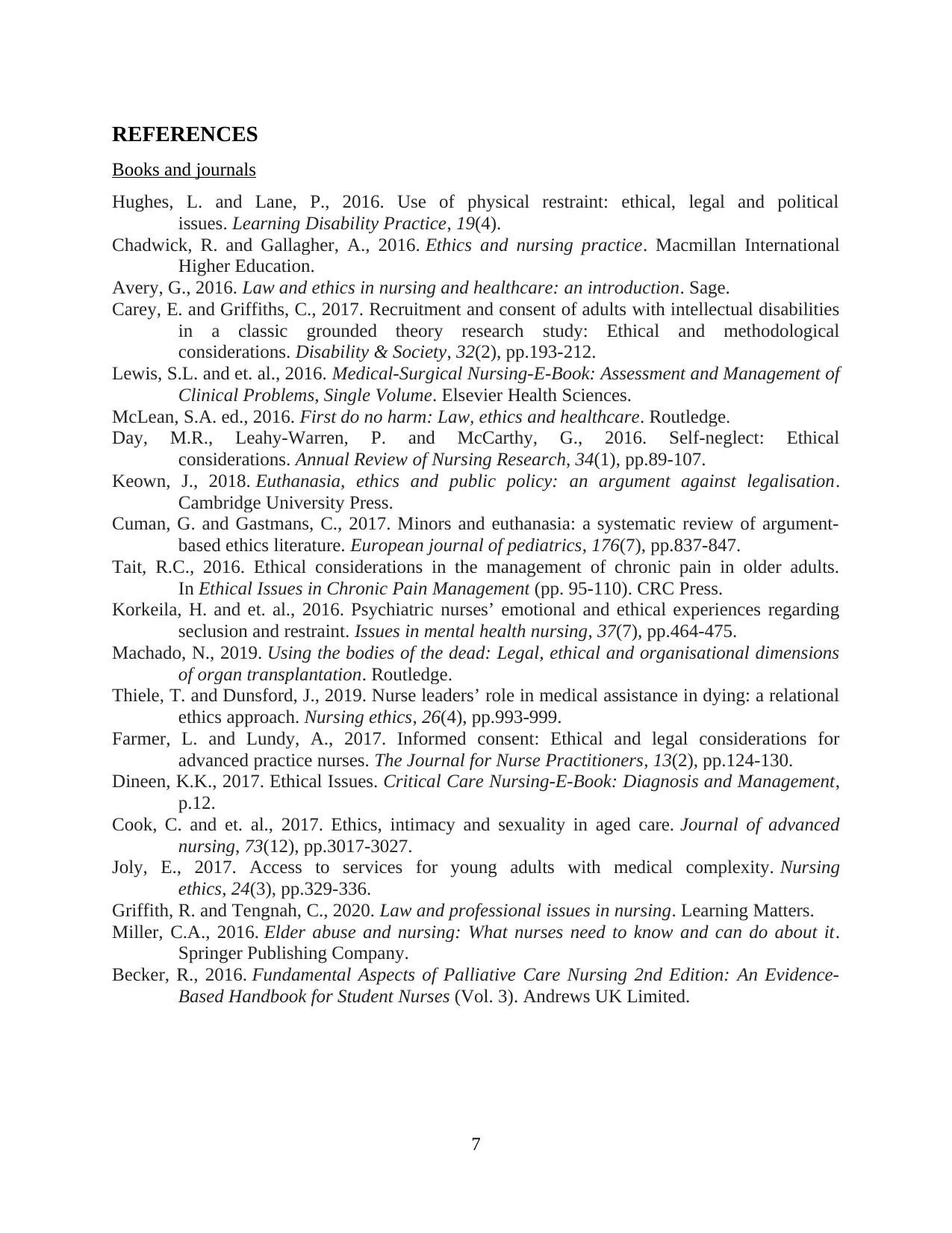
REFERENCES
Books and journals
Hughes, L. and Lane, P., 2016. Use of physical restraint: ethical, legal and political
issues. Learning Disability Practice, 19(4).
Chadwick, R. and Gallagher, A., 2016. Ethics and nursing practice. Macmillan International
Higher Education.
Avery, G., 2016. Law and ethics in nursing and healthcare: an introduction. Sage.
Carey, E. and Griffiths, C., 2017. Recruitment and consent of adults with intellectual disabilities
in a classic grounded theory research study: Ethical and methodological
considerations. Disability & Society, 32(2), pp.193-212.
Lewis, S.L. and et. al., 2016. Medical-Surgical Nursing-E-Book: Assessment and Management of
Clinical Problems, Single Volume. Elsevier Health Sciences.
McLean, S.A. ed., 2016. First do no harm: Law, ethics and healthcare. Routledge.
Day, M.R., Leahy-Warren, P. and McCarthy, G., 2016. Self-neglect: Ethical
considerations. Annual Review of Nursing Research, 34(1), pp.89-107.
Keown, J., 2018. Euthanasia, ethics and public policy: an argument against legalisation.
Cambridge University Press.
Cuman, G. and Gastmans, C., 2017. Minors and euthanasia: a systematic review of argument-
based ethics literature. European journal of pediatrics, 176(7), pp.837-847.
Tait, R.C., 2016. Ethical considerations in the management of chronic pain in older adults.
In Ethical Issues in Chronic Pain Management (pp. 95-110). CRC Press.
Korkeila, H. and et. al., 2016. Psychiatric nurses’ emotional and ethical experiences regarding
seclusion and restraint. Issues in mental health nursing, 37(7), pp.464-475.
Machado, N., 2019. Using the bodies of the dead: Legal, ethical and organisational dimensions
of organ transplantation. Routledge.
Thiele, T. and Dunsford, J., 2019. Nurse leaders’ role in medical assistance in dying: a relational
ethics approach. Nursing ethics, 26(4), pp.993-999.
Farmer, L. and Lundy, A., 2017. Informed consent: Ethical and legal considerations for
advanced practice nurses. The Journal for Nurse Practitioners, 13(2), pp.124-130.
Dineen, K.K., 2017. Ethical Issues. Critical Care Nursing-E-Book: Diagnosis and Management,
p.12.
Cook, C. and et. al., 2017. Ethics, intimacy and sexuality in aged care. Journal of advanced
nursing, 73(12), pp.3017-3027.
Joly, E., 2017. Access to services for young adults with medical complexity. Nursing
ethics, 24(3), pp.329-336.
Griffith, R. and Tengnah, C., 2020. Law and professional issues in nursing. Learning Matters.
Miller, C.A., 2016. Elder abuse and nursing: What nurses need to know and can do about it.
Springer Publishing Company.
Becker, R., 2016. Fundamental Aspects of Palliative Care Nursing 2nd Edition: An Evidence-
Based Handbook for Student Nurses (Vol. 3). Andrews UK Limited.
7
Books and journals
Hughes, L. and Lane, P., 2016. Use of physical restraint: ethical, legal and political
issues. Learning Disability Practice, 19(4).
Chadwick, R. and Gallagher, A., 2016. Ethics and nursing practice. Macmillan International
Higher Education.
Avery, G., 2016. Law and ethics in nursing and healthcare: an introduction. Sage.
Carey, E. and Griffiths, C., 2017. Recruitment and consent of adults with intellectual disabilities
in a classic grounded theory research study: Ethical and methodological
considerations. Disability & Society, 32(2), pp.193-212.
Lewis, S.L. and et. al., 2016. Medical-Surgical Nursing-E-Book: Assessment and Management of
Clinical Problems, Single Volume. Elsevier Health Sciences.
McLean, S.A. ed., 2016. First do no harm: Law, ethics and healthcare. Routledge.
Day, M.R., Leahy-Warren, P. and McCarthy, G., 2016. Self-neglect: Ethical
considerations. Annual Review of Nursing Research, 34(1), pp.89-107.
Keown, J., 2018. Euthanasia, ethics and public policy: an argument against legalisation.
Cambridge University Press.
Cuman, G. and Gastmans, C., 2017. Minors and euthanasia: a systematic review of argument-
based ethics literature. European journal of pediatrics, 176(7), pp.837-847.
Tait, R.C., 2016. Ethical considerations in the management of chronic pain in older adults.
In Ethical Issues in Chronic Pain Management (pp. 95-110). CRC Press.
Korkeila, H. and et. al., 2016. Psychiatric nurses’ emotional and ethical experiences regarding
seclusion and restraint. Issues in mental health nursing, 37(7), pp.464-475.
Machado, N., 2019. Using the bodies of the dead: Legal, ethical and organisational dimensions
of organ transplantation. Routledge.
Thiele, T. and Dunsford, J., 2019. Nurse leaders’ role in medical assistance in dying: a relational
ethics approach. Nursing ethics, 26(4), pp.993-999.
Farmer, L. and Lundy, A., 2017. Informed consent: Ethical and legal considerations for
advanced practice nurses. The Journal for Nurse Practitioners, 13(2), pp.124-130.
Dineen, K.K., 2017. Ethical Issues. Critical Care Nursing-E-Book: Diagnosis and Management,
p.12.
Cook, C. and et. al., 2017. Ethics, intimacy and sexuality in aged care. Journal of advanced
nursing, 73(12), pp.3017-3027.
Joly, E., 2017. Access to services for young adults with medical complexity. Nursing
ethics, 24(3), pp.329-336.
Griffith, R. and Tengnah, C., 2020. Law and professional issues in nursing. Learning Matters.
Miller, C.A., 2016. Elder abuse and nursing: What nurses need to know and can do about it.
Springer Publishing Company.
Becker, R., 2016. Fundamental Aspects of Palliative Care Nursing 2nd Edition: An Evidence-
Based Handbook for Student Nurses (Vol. 3). Andrews UK Limited.
7
⊘ This is a preview!⊘
Do you want full access?
Subscribe today to unlock all pages.

Trusted by 1+ million students worldwide
1 out of 9
Related Documents
Your All-in-One AI-Powered Toolkit for Academic Success.
+13062052269
info@desklib.com
Available 24*7 on WhatsApp / Email
![[object Object]](/_next/static/media/star-bottom.7253800d.svg)
Unlock your academic potential
Copyright © 2020–2026 A2Z Services. All Rights Reserved. Developed and managed by ZUCOL.




